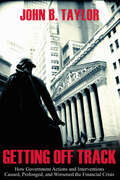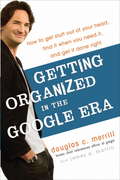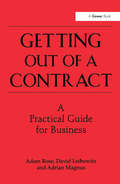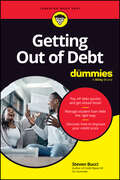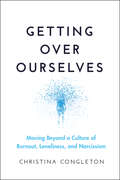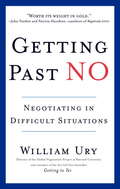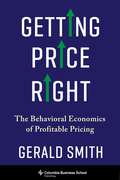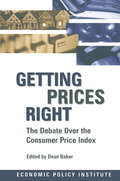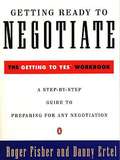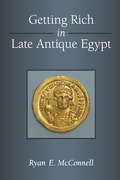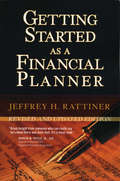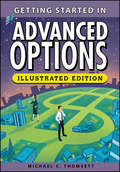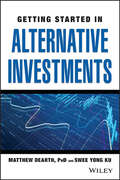- Table View
- List View
Getting Off on the Right Foot: Important First Steps
by Harvard Business Review PressOnce the team and charter are in place, several important things must be accomplished before a team's work commences. Drawing up plans for reaching the intended goal and mapping out how the work will be broken down are critical to a team's ultimate success. This chapter shows how to address these preliminary tasks in an attempt to streamline the process.
Getting Off the Treadmill: Competing for the Future
by C. K. Prahalad Gary HamelAny company that fails to create the markets of the future, will find itself on a treadmill, trying to keep one step ahead of the steadily declining margins and profits of yesterday's businesses. This chapter asks managers to evaluate their company's ability and willingness to imagine and create the future and to look beyond restructuring and reengineering toward a new strategy for industry transformation.
Getting Off Track: How Government Actions and Interventions Caused, Prolonged, and Worsened the Financial Crisis
by John B. TaylorIn this concise volume, leading economist John B. Taylor offers empirical research to explain what caused the current financial crisis, what prolonged it, and what dramatically worsened it more than a year after it began. The evidence he presents strongly suggests that specific government actions and interventions are largely to blame and that any future government interventions must be based on a clearly stated diagnosis of the problem and a rationale for the interventions.
Getting Organized in the Google Era: How to Get Stuff Out of Your Head, Find It When You Need It, and Get It Done Right
by Douglas C. Merrill James A. MartinGoogle CIO Merrill's work is chock-full of practical, invaluable, and often counterintuitive advice for anyone who wants to be more organized and productive-and less stressed--in this 21st-century world.
Getting Out of a Contract - A Practical Guide for Business: A Practical Guide For Business
by Adam Rose David LeibowitzThis book is written by three commercial lawyers. Their clients often ask them as much for help in getting out of a contract as in getting them into one in the first place. Built around two business case studies, the book highlights the various legal issues that a business must address when faced with a contract it wants to walk away from. In the first instance the business needs to discover whether it is as shackled by a contract as it thinks it is. In many cases a contract is not as binding as it might initially appear - Getting Out of a Contract explains the circumstances in which this applies. It then goes on to explore how to minimize the damage should the agreement be inescapable and helps the reader to understand what the consequences of any actions might be. Written in plain English, the authors manage to demystify complicated aspects of English law for the non-lawyer. This book will help managers to: ¢ address how they make contracts; ¢ avoid making wrong decisions because they fail to appreciate what contracts they actually have or how to get round them; ¢ become more attuned to the legal ins and outs of contracts, enabling them to use lawyers more cost-effectively Company secretaries, finance directors and managers at all levels will find Getting Out of a Contract accessible and an invaluable business planning tool.
Getting Out of Debt For Dummies
by Steven BucciGet out and stay out of debt the smart and easy way This is a clear and simple guide to getting out from under credit card debt, student loan debt, and all other forms of owing people money. With simple changes and smart decisions, you can start today and enjoy financial stability moving forward. This book covers everything you need to know to take the sting out of those monthly repayments, offering strategies for coping with personal loans, car loans, mortgages, home equity loans, and beyond. Getting Out of Debt For Dummies will help you prioritize and consolidate debt, so you can pay off the most pressing bills first and reduce the number of debtors coming after you. You'll also get pro tips for using credit cards responsibly, building up your credit score, and avoiding debt-generating traps when you make purchases. Getting out of debt doesn't have to be overwhelming. Let this Dummies guide help you quickly and easily repair your finances. Understand the different types of debt, including good and bad debt Develop a strategy for managing student loans and getting on a repayment plan Know what you're signing up for when you use credit cards and pay-later platforms Negotiate with collection agencies, the IRS, and angry creditors Design a realistic and painless payback schedule—even for serious debt For the millions who have substantial debt and want to turn their financial situation around, Getting Out of Debt For Dummies offers hope and a straightforward way forward.
Getting Over Ourselves: Moving Beyond a Culture of Burnout, Loneliness, and Narcissism
by Christina CongletonMove beyond empty “life hacks” to connect with your deepest humanity In Getting Over Ourselves: Moving Beyond a Culture of Burnout, Loneliness, and Narcissism, human development specialist and leadership coach Christina Congleton delivers an insightful and urgently needed discussion of how people can break out of the tired cliches of the self-help genre, and move toward new levels of connection, engagement, and capacity in navigating an uncertain world. In the book, you'll explore how modern attitudes of individualism that were once freeing now converge with environmental destruction, inequality, and an alarming uptick in depression, substance abuse, and suicide to significantly damage the potential of people everywhere. You'll also find concrete strategies—rooted in developmental psychology—that show us new ways to approach these challenging times. Getting Over Ourselves offers: Insights into why “life hacks,” productivity seminars, and more “adulting” are not the solutions to the issues faced by people today Frameworks that reject the idea that there is a separate, solitary self in need of constant improvement, and connect you with your deepest humanity Effective techniques for fending off burnout and ways to move beyond the unsatisfactory status quo An essential and timely work, Getting Over Ourselves is the antidote to the skin-deep, ineffective “self-help” material that you've been looking for.
Getting Past No: Negotiating in Difficult Situations
by William UryWe all want to get to yes, but what happens when the other person keeps saying no? How can you negotiate successfully with a stubborn boss, an irate customer, or a deceitful coworker? In Getting Past No, William Ury of Harvard Law School's Program on Negotiation offers a proven breakthrough strategy for turning adversaries into negotiating partners. You'll learn how to: - STAY IN CONTROL UNDER PRESSURE - DEFUSE ANGER AND HOSTILITY - FIND OUT WHAT THE OTHER SIDE REALLY WANTS - COUNTER DIRTY TRICKS - USE POWER TO BRING THE OTHER SIDE BACK TO THE TABLE - REACH AGREEMENTS THAT SATISFY BOTH SIDES NEEDS. Getting Past No is the state-of-the-art book on negotiation for the twenty-first century. It will help you deal with tough times, tough people, and tough negotiations. You don t have to get mad or get even. Instead, you can get what you want!
Getting Permission: How to License & Clear Copyrighted Materials Online & Off
by Richard StimIf you're using copyrighted material, don't get sued--get permission! Online or off, before you use some or all of a song, photo, book, or any other work covered by copyright law, you need to get permission first. If you don't, you could end up facing legal action from the rights-holder. This easy-to-use book shows you how to get the rights you need, with step-by-step instructions and more than 30 forms. Find out when permission is required, who to ask, and when (and how much) you can expect to pay. Getting Permission explains: the copyright permission process the public domain ("free" content) how to figure out who owns a copyright website permissions the "fair use" rule school-related permissions license and merchandise agreements (including sample contracts and other forms) and much more. The 6th edition is updated with summaries of recent copyright and fair use cases, as well as dozens of real-life questions from the Dear Rich permissions blog. Downloadable forms available at nolo.com
Getting Permission: How to License & Clear Copyrighted Materials Online & Off
by Richard StimIf you’re using copyrighted material, don’t get sued—get permission! Online or off, before you use some or all of a song, photo, book, or any other work covered by copyright law, you need to get permission first. If you don’t, you could end up facing legal action from the rights-holder. This easy-to-use book shows you how to get the rights you need, with step-by-step instructions and more than 30 forms. Find out when permission is required, who to ask, and when (and how much) you can expect to pay. Getting Permission explains: the copyright permission process the public domain (“free” content) how to figure out who owns a copyright website permissions the “fair use” rule school-related permissions license and merchandise agreements (including sample contracts and other forms) and much more. This edition is updated with summaries of recent copyright and fair use cases, as well as dozens of real-life questions from the Dear Rich permissions blog. All forms are downloadable through a special link in the book.
Getting Permission
by Richard StimUsing copyrighted materials? Get permission and stay legal If you plan to use any copyrighted material for your own purposes, you need to get permission first from the owners of that work. If you don't, you could find yourself slapped with an expensive and time consuming lawsuit. Getting Permission tackles the permissions process head on without the legalese. It shines the light on whom to ask for permission, as well as when and how much to expect to pay for permission. Comprehensive and easy to read, the book covers: - the permissions process - the public domain - copyright research - fair use - academic permissions - the elements of a license and merchandise agreement - the use of a trademark or fictional character - and much more Getting Permission includes agreements for acquiring authorization to use text, photographs, artwork, and music, whether it's found online or off. The edition of this essential guide is completely updated to reflect the latest laws and court decisions. Plus, read an all new collection of practical, real life FAQs, based on author Richard Stim's popular intellectual property blog, Dear Rich: Nolo's Patent, Copyright & Trademark Blog. With Downloadable Forms
Getting Personal: Developing Yourself as a Design Thinker
by Roger L. MartinThe CEO is not the only one in the organization who should be a design thinker. In fact, if the CEO and other senior managers in your organization are resistant to design-thinking principles and nurture a culture that is hostile to innovation in favor of maintaining the status quo, it may be up to you to hone your own design-thinking skills, increase awareness, and encourage others in the organization to adopt a design approach. This chapter will help you increase your creative output and learn how to work more effectively with non-design thinkers in your organization, rather than engaging in counterproductive battles that result in standoffs, hard feelings, and inaction. Both skills will help you be a capable and successful design-thinking CEO someday. This chapter was originally published as Chapter 7 of "The Design of Business: Why Design Thinking Is the Next Competitive Advantage."
Getting Price Right: The Behavioral Economics of Profitable Pricing
by Dr. Gerald SmithHow do leaders, managers, and proprietors go about the essential task of setting prices? What biases enter into this process, and why? How can a business debias its price setting to become more productive, strategic, and profitable?Combining perceptive insights from behavioral economics with leading-edge ideas on price management, this book offers a new approach to pricing. Gerald Smith demonstrates why understanding, reframing, and refining everyday pricing processes—a firm’s or manager’s pricing orientation—results in a better long-term pricing strategy. He explores how pricing actually happens in practice and shows how to identify and remove the psychological blinders that cause suboptimal decisions and policies. Smith details how to improve pricing orientation by combining the soft behavioral skills that intuitively shape and refine pricing practice with the hard analytic skills that guide and structure pricing strategy. The result is more rational and more profitable pricing—with respect to not only revenue and profitability but also employee productivity and customer satisfaction.Offering an accessible and actionable model, Getting Price Right is the first book to apply behavioral economics to managerial price setting. It is a must-read for corporate business leaders, thought leaders, and professionals interested in advances in pricing and for managers, entrepreneurs, proprietors, and small and midsize business owners whose everyday work involves pricing.
Getting Prices Right: Debate Over the Consumer Price Index
by Dean BakerCompiled by the Bureau of Labor Statistics, the CPI is used to index Social Security payments and many other federal programs, as well as to adjust tax brackets. Today, the accuracy of the CPI is being hotly debated, particularly in light of the Boskin Commission report that concluded in December 1996 that the CPI overstates inflation by 1.1%. If accepted and applied in the formulation of economic policy, the report would have major implications for balancing the federal budget. It would have a direct impact on the lives of Americans who are beneficiaries of government programs as well as on everyone who pays taxes. In this book, Dean Baker introduces and explains the significance of the debate, presents the full text of the Boskin Commission report and finally discusses in a far-reaching and insightful analysis both the Commission's research methodology and its conclusions.
Getting Ready to Negotiate: The Getting to Yes Workbook
by Roger Fisher Danny ErtelThis companion volume to the negotiation classic Getting to Yes explores the negotiation process in depth and presents case studies, charts, and worksheets for blueprinting and personalized negotiating strategy.
Getting Ready to Negotiate
by Roger Fisher Danny ErtelThis companion volume to the negotiation classic Getting to Yes explores the negotiation process in depth and presents case studies, charts, and worksheets for blueprinting and personalized negotiating strategy.
Getting Real About Having it All: Be Your Best, Love Your Career and Bring Back Your Sparkle
by Megan Dalla-CaminaA book which provides expert career guidance, helping you to bring out your personal best, build and shape a career that you love and guide you towards creating true wellbeing in your life.
Getting Reorgs Right
by Stephen Heidari-Robinson Suzanne HeywoodChances are you've experienced at least one company reorganization. Reorgs can be a great way to unlock value: Two-thirds of them deliver at least some performance improvement, and with change accelerating in the business environment, they are becoming more and more common, the authors say. But most reorgs aren't entirely successful: According to a survey conducted at McKinsey, more than 80% fail to deliver the value they are supposed to in the time planned, while 10% cause real damage to the company involved. More important, they can be miserable experiences for employees. Research suggests that reorgs--and the accompanying uncertainty about what the future holds--may cause greater stress and anxiety than layoffs, leading to noticeably reduced productivity in about 60% of cases. That's because the leaders of reorgs don't specify their objectives clearly enough, miss some of the key actions (for example, focusing on reporting lines and forgetting processes and people), or do things in the wrong order (such as deciding on the way forward before assessing the strengths and weaknesses of what they have already). To help maximize the value and minimize the misery of reorgs, the authors have developed a simple five-step process for running them.
Getting Rich in Late Antique Egypt
by Ryan McconnellPapyrologists and historians have taken a lively interest in the Apion family (fifth through seventh centuries), who rose from local prominence in rural Middle Egypt to become one of the wealthiest and most powerful families in the Eastern Roman Empire. The focus of most scholarly debate has been whether the Apion estate—and estates like it—aimed for a marketable surplus or for self-sufficiency. Getting Rich in Late Antique Egypt shifts the discussion to precisely how the Apions’ wealth was generated and what role their Egyptian estate played in that growth by engaging directly with broader questions of the relationship between public and private economic actors in Late Antiquity, rational management in ancient economies, the size of estates in Byzantine Egypt, and the role of rural estates in the Byzantine economy. Ryan E. McConnell connects the family’s rise in wealth and status to its role in tax collection on behalf of the Byzantine state, rather than a reliance on productive surpluses. Close analysis of low- and high-level accounts from the Apion estate, as well as documentation from comparable Roman and Byzantine Egyptian estates, corroborate this conclusion. Additionally, McConnell offers a third way into the ongoing debate over whether the Apions’ relationship with the state was antagonistic or cooperative, concluding that the relationship was that of parties in a negotiation, with each side seeking to maximize its own benefit. The application of modern economic concepts—as well as comparisons to the economies of Athens, Rome, Ptolemaic Egypt, and Early Modern France—further illuminate the structure and function of the estate in Late Antique Egypt. Getting Rich in Late Antique Egypt will be a valuable resource for philologists, archaeologists, papyrologists, and scholars of Late Antiquity. It will also interest scholars of agricultural, social, and economic history.
Getting Started: Designing a Forced Ranking System That Works
by Dick GroteThis chapter shows you how to set up a forced ranking system that works-one that is fair and humane, one that produces valid and reliable information and enjoys the understanding and support of organization members.
Getting Started as a Commercial Mortgage Broker
by Gineris Peter J.While residential real estate lending has gone soft, commercial lending is hot-with a wave of low interest rates and refinancing-and it shows no sign of slowing down. Right now, commercial mortgage brokering is one of the best ways to earn money without a ton of training. In this practical guide for first-timers, you'll learn the basics of brokering from application to closing, as well as inside information you won't find anywhere else. So get started!
Getting Started as a Financial Planner (Bloomberg #8)
by Jeffrey H. RattinerThere has never been more opportunity for financial planners--or more reasons for financial professionals to consider switching the direction of their careers into this lucrative field. Today's planners will cash in on the huge surge of baby boomers preparing for retirement in the decades ahead. And as the number and complexity of investments rises, more individuals will look to financial advisers to help manage their money. In the new paperback edition of this guide, Jeffrey H. Rattiner, a practicing financial planner and educator, provides a complete, systematic, turnkey framework for the aspiring planner to follow. Starting from the key question, "Why do you want to be a financial planner?" the author guides you through the development of an effective infrastructure and client management system for your practice. The many essential concepts are clearly illustrated with examples from practicing professionals. Throughout this handbook, Rattiner provides personal insights on how and why a planner must develop a solid understanding of client needs before building a comprehensive financial plan. Getting Started as a Financial Planner has everything one needs to know—from how to set up a practice and communicate with clients to how to manage investments and market services—in order to launch a career in financial planning and to attain success in this high-growth profession.
Getting Started as a Freelance Writer (The Culture Tools Series)
by Robert W. BlyThis expanded edition goes beyond advice on making a living as a business writer to include the more creative forms of writing. There are new chapters on writing and selling poems, short stories, novels, and essays, plus a new section on cartooning. Existing chapters have been brought up to date. You learn to start, run, and build a freelance writing business doing whatever type of writing you prefer.
Getting Started in Advanced Options
by Michael C. ThomsettAn illustrated, easy-to-read guide to advanced options tradingIn Getting Started in Advanced Options, Illustrated Edition, bestselling author Michael C. Thomsett uses nontechnical, easy-to-follow language to demystify the options markets, distinguishing the imagined risks from the real ones and arming investors with the facts they need to make more informed decisions. This illustrated edition includes colourful illustrations, including charts and graphs that make complex subject matter easy to understand. Fully updated to cover the latest changes in the markets, the book introduces advanced strategies and concepts that every successful trader needs. It covers how options can reduce risk, spread strategies, hedges and straddles, swing trading with options, options on futures and indexes, synthetic positions based on options, risks and taxes, choosing stocks for options trading, and more.An ideal illustrated companion volume to Michael C. Thomsett's Getting Started in Advanced OptionsUpdated to include the latest changes and newest information on the marketsLoaded with easy-to-understand graphs, charts, and other illustrationsThis new illustrated addition to the Getting Started In series makes advanced options trading easy to understand with clear examples, handy illustrations, and plain-English explanations.
Getting Started in Alternative Investments (Getting Started In...)
by Matthew Dearth Swee Yong KuExplore exciting alternatives to traditional securities in this eye-opening investment resource In Getting Started in Alternative Investments: Understanding the World of Investment Strategies, a team of accomplished investment and finance experts delivers a concise and robust exploration of mainstream and alternative investments. From cryptocurrencies to streetwear, you'll learn about new opportunities for investment capturing the imagination of the latest generation of investors. In this book, the authors discuss investments as varied as catastrophe bonds and non-fungible tokens, as well as the growing influence of the ESG (Environmental, Social, and Governance) movement on different financial instruments. It also examines: More "traditional" alternatives to typical securities, like venture capital, private equity, and real estate-related investments "Modern" alternative investments, including alternative finance (e.g., peer-to-peer lending), insurance-linked securities, and impact investing Niche assets, such as intellectual property (e.g., royalties and patents), fractional ownership of collectibles, and income-sharing agreements Getting Started in Alternative Investments is a must-read book for individual and retail investors, as well as investment and finance professionals seeking to expand their investment horizons beyond traditional stocks and bonds.

